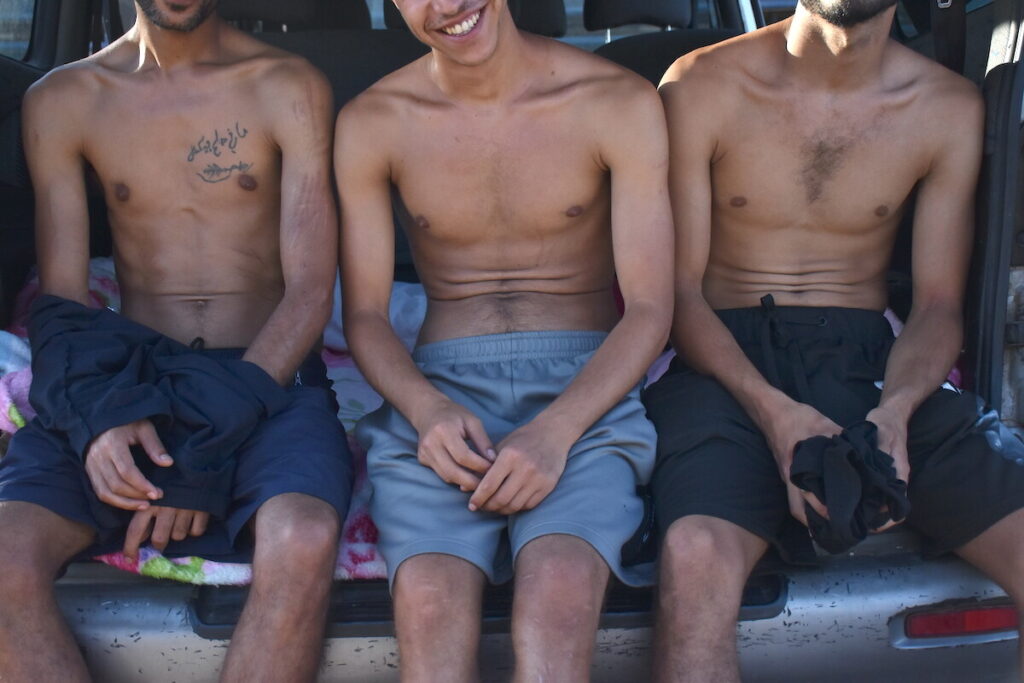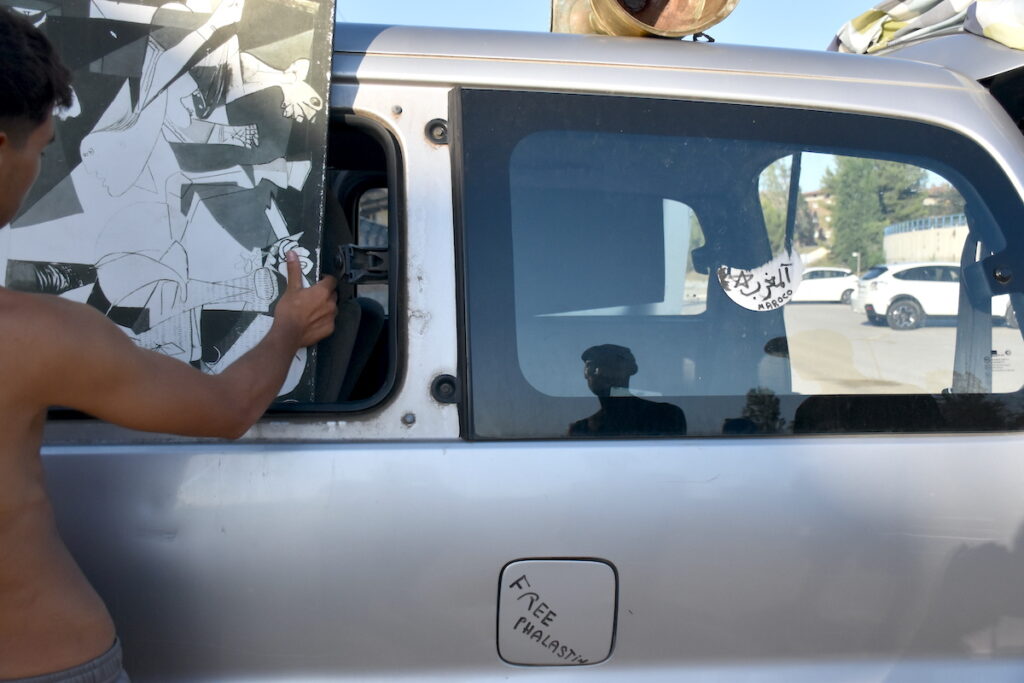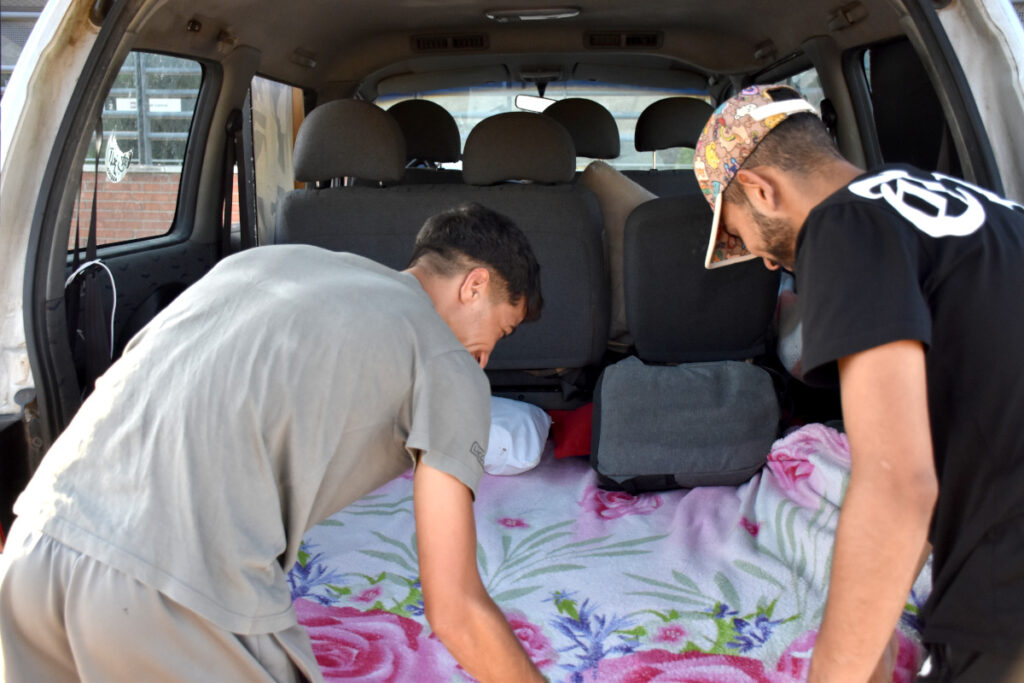‘We can hardly do anything here: we have to get up at 7 o’clock because it’s already too hot’. Oussama, Salah and Jawad are three young men who live in Sant Cugat in an abandoned van. All three were born in Morocco and came here due to the lack of future opportunities in their country. Oussama is 24 years old and has been here in Catalonia for seven years. Salah, 21, is the youngest, and has been here for almost 10 years, since 2015. Jawad, 32, has spent many years travelling and working in different European countries.
When asked why they live in Sant Cugat, the answer is that, on the one hand, they found an abandoned van where they could sleep. But they also add that it is because it is a quiet city: ‘We don’t want any trouble. We haven’t come here to steal or to commit crime, as everyone thinks, we just want to work, be quiet and go about our lives. You can ask the neighbours. Oussama has a stable job, but the other two do not, and every day they leave the van and make a living ‘as best they can’, recycling objects they find and doing other similar jobs.

Until now, Oussama had never lived on the street, he explains. He spent a few months in a centre for minors, and then moved into a DGAIA (Directorate General for Child and Adolescent Care) flat with two friends from the centre, where he was able to continue living until he was 21. Since then, he regularised his administrative situation and has been working in many different places (as a waiter, a painter, in security, in the Oropastry company in Rubí – making doughnuts, he points out). He is currently working in construction.
He earns between 1,200 and 1,300 euros a month, which would allow him to pay a rent, but he can’t find one: ‘When they find out you’re young and Moroccan, you know what happens. They don’t want to rent you a room. Discrimination in the housing market has been denounced on many occasions by organisations such as SOS Racisme, for example in its latest annual report. In addition, in Sant Cugat two years ago it was revealed at an event organised by elCugatenc that real estate agencies had refused to rent to refugees in the City Council, as explained by the Councillor for Cooperation, Gemma Aristoy (ERC). More recently, Suiry Sobrino, an Amnesty International activist, also denounced the real estate racism she has experienced first-hand at the StQBlack round table on civil rights and anti-racism, moderated by elcugatenc.

As for his companions, Salah says that he is from Madrid, and that he was born in the city of Tetuan. However, he has been in the state for almost 10 years, since 2015. ‘Now I have papers,’ he explains proudly. Jawad, for his part, has three training diplomas as a mechanic, electrician and butcher, and had worked for many years in Morocco: ‘I was a good worker’, he says.
‘I wish I could change the mentality of the people here’.
The three friends explain that they have suffered other types of racism, also from the extreme right. Jawad recounts, between irony and indignation, that when he worked in the fields in Almería, he had a Vox boss who told him that he did not want immigrants, even though most of his workers were immigrants. ‘I was there, picking fruit, we were paid 4 euros an hour, and I worked 9 hours. I didn’t sleep well, and I always had back pain’, he explains, stumbling between Spanish and French.
Jawad confesses that what he would most like is precisely ‘to change the mentality of the people here’. ‘They put us all in the same bag, and it’s not fair, because we know that there are people who behave badly, and they think we will all behave badly’. Saying this is Abdel, 21, a friend of the other three and who also lives on the street, though not in the van. Salah talks about how people who pass by them ‘change their faces’. ‘You can tell we are in Sant Cugat, the second richest town in Spain,’ he adds.
‘We are very young and we are losing our lives in the street. We eat badly, at the wrong time, sometimes we don’t eat at all’, says Abdel, showing industrial sweets that he bought a short while ago. ‘They tell us to ‘go back to your country’, but we want to work, we all have a degree, and he has a job’, says Abdel, referring to Oussama.
‘In fruit, in street construction, in the fields, as waiters, mechanics… Moroccans work in Spain’, says Jawad. Oussama agrees and adds: ‘They judge us, but they forget our countrymen, who work for the country. For the moment, not all of us can do it, but the day we can, we will all work for the country.
They have also met ‘good people’, who have helped them and brought them food, they explain. ‘Out of 100, 60 are racist and 30 have a good heart”: the statistic (in which there will always be the question of what happens to the 10 per cent) is Salah’s.
Daily life in the van
‘We have a routine, as best we can,’ says Salah. ‘In the morning, we take a shower, every day,’ Oussama stresses. At the fountain, or wherever they can. Abdel, who also takes part in the conversation, comments that he has studied hairdressing (you can see that the hairstyle he is wearing is professional), and that he had previously studied a PFI (training and integration programme).
They also show how they arrange the back of the van with blankets and cushions to make the sleeping space as comfortable as possible. There is a link that comes to mind between the space where they sleep and the videos that fill the internet explaining how to fit out a van or a car to travel on a ‘low’ budget but buying many objects that make the stay much more comfortable.

The heat waves have taken their toll: the van insulates very little from the outside temperature or, directly, it is worse because of the overheating effect. They all immediately point out that Jawad is the one who is having the worst time, because they explain that he has an illness that they cannot specify, but which makes him short of breath. ‘He should be in a medical centre, well cared for, not living in the street’, say the others, and some of the windows of the vehicle are completely broken. They say that a few days ago, someone stole their clothes and shoes that they had stored in the van: ‘Now Salah has to wear flip-flops,’ they say, showing a pair of Crocs. It is one of the many vulnerabilities of living on the street. They point out that everyone thinks they are thieves, but instead they are victims of theft.
Another problem is contact with family. Jawad’s mobile phone has broken, and he has been unable to talk to his family for days: ‘He had all his contacts there, everything’. He explains that he is the youngest child in an extended family, and that his mother is already ninety years old. It is easy to imagine the anguish on both sides at the lack of contact. Even for the others, who do have a working mobile phone, keeping it charged during the day is a challenge, and on some of the visits we make, they are not there because they are looking for a place to charge it.
When asked what they need most, Oussama is very clear: ‘A room’. Abdel adds: ‘I want a rent, and I can’t find one, I could pay between 200 and 300 euros because I have savings’. Jawad is very clear that he wants a job, whatever it is, that he can work: ‘I know how to work as a butcher, electrician and mechanic, and I can do other things, too’. In contrast, Salah is not as clear about what he wants to do as the others; like so many 21-year-olds.
Hope and music
Towards the end of the interview, Abdel starts rapping skilfully. ‘I’m a rapper, I don’t want fame, just to be loved. ‘They called us sub-normals, illegals, Moors. But we will break with everything’. He also plays ‘Confianza’ (Confidence) by the singer Morad on his mobile phone and knows by heart the lyrics of songs that denounce social and racial injustice and police abuse. Morad is from L’Hospitalet, the son of immigrant parents from Morocco. ‘Do you know who she is?’ asks Oussama. ‘Of course she knows, if she’s from here, how can she not?’, replies Salah.
Salah says that they too are MDLR (from the phrase mec de la rue, French for ‘street kid’, which Morad identifies with). But they point out that they are indeed ‘from the street’, that Morad is only in the street, but had not lived in the street. Speaking of his origins in the neighbourhood (Florida) and his current success, Morad sings: ‘Remember that life can change you’.


